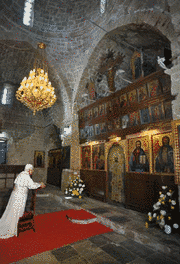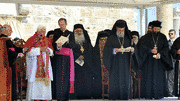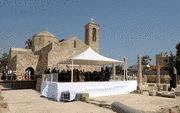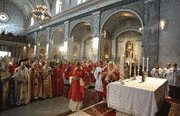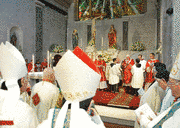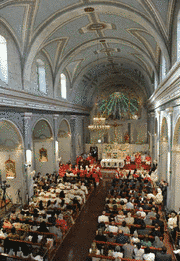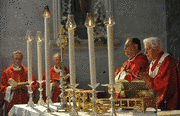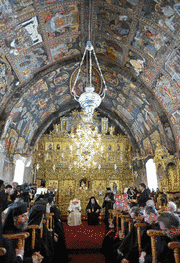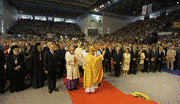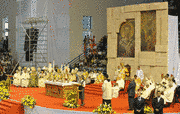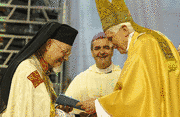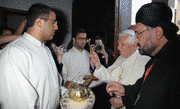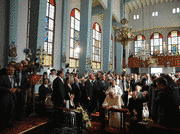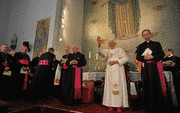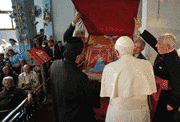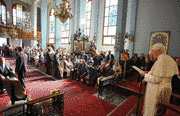Benedict XVI's Apostolic Pilgrimage to Cyprus
4th - 6th June 2010
Pope Benedict XVI was a pilgrim to Cyprus in 2010 on his 16th apostolic voyage, for the Solemnity of Corpus Christi and the consignment of Instrumentum laboris, on 'the Catholic Church in the Middle East: Communion and Witness.'
Papa Benedetto's itinerary included:
Friday 4th June - Welcome ceremony at Paphos Airport
Saturday 5th June - Meeting with the civil authorities and diplomatic corps, with the Catholic community of Cyprus, and with His Beatitude Chrysostomos II before celebrating Mass at the parish Church of the Holy Cross.
Sunday 6 June - Mass for Corpus Christi Sunday was celebrated with the publication and consignment of the Instrumentum laboris of the Special Assembly for the Middle East of the Synod of Bishops. This was followed by the Angelus prayer and a visit to the Cathedral of the Maronite Church of Cyprus, before the farewell ceremony at Larnaca airport.
On the flight to Cyprus, Papa Benedetto spoke with journalists. This was followed by an Ecumenical Celebration in the archeological area of the church of Agia Kiriaki Chrysopolitissa. You can read Instrumentum Laboris "The Catholic Church in the Middle East: Communion and Witness. 'Now the company of those who believed were of one heart and soul' (Acts 4, 32)" in Arabic, English, French & Italian. Also there is a Missal for the Apostolic Journey to Cyprus.
Papa Benedict XVI's Address at the Welcoming Ceremony
International Paphos Airport, Friday 4 June 2010 - in English, French, German, Italian, Portuguese & Spanish
"Mr President, Your Beatitude Chrysostomos, Your Beatitudes, Excellencies,
Distinguished Authorities, Ladies and Gentlemen,
Χαίρετε! Ειρήνη μαζί σας! Είναι μεγάλη η χαρά μου που είμαι σήμερα μαζί σας.
Mr President, I am grateful for the kind invitation to visit the Republic of Cyprus. I express my cordial greetings to you and to the Government and people of this nation, and thank you for your gracious words of welcome. I also recall with gratitude your recent visit to the Vatican and look forward to our meeting tomorrow in Nicosia.
Cyprus stands at the crossroads of cultures and religions, of histories both proud and ancient but which still retain a strong and visible impact upon the life of your country. Having recently acceded to the European Union, the Republic of Cyprus is beginning to witness the benefit of closer economic and political ties with other European states. Membership has already given your country access to markets, technology and know-how. It is greatly to be hoped that membership will lead to prosperity at home and that other Europeans in their turn will be enriched by your spiritual and cultural heritage which reflects your historical role, standing between Europe, Asia and Africa. May the love of your homeland and of your families and the desire to live in harmony with your neighbours under the compassionate protection of almighty God, inspire you patiently to resolve the remaining concerns that you share with the international community for the future of your island.
Following in the footsteps of our common fathers in the faith, Saints Paul and Barnabas, I have come among you as a pilgrim and the servant of the servants of God. Since the Apostles brought the Christian message to these shores, Cyprus has been blessed by a resilient Christian heritage. I greet as a brother in that faith His Beatitude Chrysostomos the Second, Archbishop of Nea Justiniana and all Cyprus, and I look forward shortly to meeting many more members of the Orthodox Church of Cyprus. I also look forward to greeting other Cypriot religious leaders. I hope to strengthen our common bonds and to reiterate the need to build up mutual trust and lasting friendship between all those who worship the one God.
As the Successor of Peter, I come in a special way to greet the Catholics of Cyprus, to confirm them in the faith (cf Lk 22:32) and to encourage them to be both exemplary Christians and exemplary citizens, and to play a full role in society, to the benefit of both Church and state.
During my stay with you, I will also consign the Instrumentum Laboris, a working document in view of the Special Assembly for the Middle East of the Synod of Bishops to be held later this year in Rome. That Assembly will examine many aspects of the Church’s presence in the region and the challenges that Catholics face, sometimes in trying circumstances, in living out their communion within the Catholic Church and offering their witness in the service of society and the world. Cyprus is thus an appropriate place in which to launch our Church’s reflection on the place of the centuries-old Catholic community in the Middle East, our solidarity with all the Christians of the region and our conviction that they have an irreplaceable role to play in peace and reconciliation among its peoples.
Mr President, dear friends, with these thoughts, I entrust my pilgrimage to Mary, the Mother of God, and to the intercession of Saints Paul and Barnabas.
Ο Θεός ας ευλογήση τον Κυπριακό Λαό. Η Παναγία ας σας προστατεύει πάντα!"
BXVI's Address at the Ecumenical Celebration
Archeological area of the church of Agia Kiriaki Chrysopolitissa, Paphos,
4 June 2010 - in English, French, German, Italian, Portuguese & Spanish + video
Dear brothers and sisters in Christ,
“Η χάρις και η ειρήνη ας είναι πλούσια μαζί σας” (1 Pet 1:2). Με μεγάλη μου χαρά χαιρετώ εσάς που αντιπροσωπεύετε τις διάφορες χριστιανικές κοινότητες παρούσες στην Κύπρο. [1]
I thank His Beatitude Chrysostomos II for his gracious words of welcome, His Eminence Georgios, the Metropolitan of Paphos, our host, and all those who have helped to make this meeting possible. I am also pleased cordially to salute the Christians of other confessions present, including those of the Armenian, Lutheran and Anglican communities.
It is truly an extraordinary grace for us to gather together in prayer in this Church of Agia Kiriaki Chrysopolitissa. We have just heard a reading from the Acts of the Apostles which reminds us that Cyprus was the first stage in the missionary journeys of the Apostle Paul (cf Acts 13:1-4). Set apart by the Holy Spirit, Paul, accompanied by Barnabas, a native of Cyprus, and Mark, the future evangelist, first came to Salamis, where they began to proclaim the word of God in the synagogues. Traversing the island, they reached Paphos where, close to this very place, they preached in the presence of the Roman pro-consul Sergius Paulus. Thus it was from this place that the Gospel message began to spread throughout the Empire, and the Church, grounded in the apostolic preaching, was able to take root throughout the then-known world.
The Church in Cyprus can rightly be proud of her direct links to the preaching of Paul, Barnabas and Mark, and her communion in the apostolic faith, a communion which links her to all those Churches who preserve that same rule of faith. This is the communion, real yet imperfect, which already unites us, and which impels us to overcome our divisions and to strive for the restoration of that full visible unity which is the Lord’s will for all his followers. For, in Paul’s words, “there is one body and one spirit, just as you were called to the one hope of your calling, one Lord, one faith, one baptism” (Eph 4:4-5).
The Church’s communion in the apostolic faith is both a gift and a summons to mission. In the passage from Acts which we have heard, we see an image of the Church’s unity in prayer, and her openness to the promptings of the Spirit of mission. Like Paul and Barnabas, every Christian, by baptism, is set apart to bear prophetic witness to the Risen Lord and to his Gospel of reconciliation, mercy and peace. In this context, the Special Assembly for the Middle East of the Synod of Bishops, due to meet in Rome next October, will reflect on the vital role of Christians in the region, encourage them in their witness to the Gospel, and help foster greater dialogue and cooperation between Christians throughout the region. Significantly, the labours of the Synod will be enriched by the presence of fraternal delegates from other Churches and Christian communities in the region, as a sign of our common commitment to the service of God’s word and our openness to the power of his reconciling grace.
The unity of all Christ’s disciples is a gift to be implored from the Father in the hope that it will strengthen the witness to the Gospel in today’s world. The Lord prayed for the holiness and unity of his disciples precisely so that the world might believe (cf Jn 17:21). Just 100 years ago, at the Edinburgh Missionary Conference, the acute awareness that divisions between Christians were an obstacle to the spread of the Gospel gave birth to the modern ecumenical movement. Today we can be grateful to the Lord, who through his Spirit has led us, especially in these last decades, to rediscover the rich apostolic heritage shared by East and West, and in patient and sincere dialogue to find ways of drawing closer to one another, overcoming past controversies, and looking to a better future.
The Church in Cyprus, which serves as a bridge between East and West, has contributed much to this process of reconciliation. The path leading to the goal of full communion will certainly not be without its difficulties, yet the Catholic Church and the Orthodox Church of Cyprus are committed to advancing in the way of dialogue and fraternal cooperation. May the Holy Spirit enlighten our minds and strengthen our resolve, so that together we can bring the message of salvation to the men and women of our time, who thirst for the truth that brings authentic freedom and salvation (cf Jn 8:32), the truth whose name is Jesus Christ!
Dear sisters and brothers, I cannot conclude without evoking the memory of the saints who have adorned the Church in Cyprus, and in particular Saint Epiphanius, Bishop of Salamis. Sanctity is the sign of the fullness of Christian life, a profound inner docility to the Holy Spirit who calls us to constant conversion and renewal as we strive to be ever more conformed to Christ our Saviour. Conversion and holiness are also the privileged means by which we open our minds and hearts to the Lord’s will for the unity of his Church. As we give thanks for this meeting and for the fraternal affection which unites us, let us ask Saints Barnabas and Epiphanius, Saints Peter and Paul, and all God’s holy ones, to bless our communities, to preserve us in the faith of the Apostles, and to guide our steps along the way of unity, charity and peace.
Benedict XVI's Homily at Mass at the Latin parish Church of the Holy Cross, Nicosia
attended by priests, religious, deacons, catechists & representatives of Cyprian ecclesial movements
5 June 2010 - in English, French, German, Italian, Portuguese & Spanish + video
"Dear brothers and sisters in Christ,
The Son of Man must be lifted up, so that whoever believes in him may have eternal life (cf Jn 3:14-15). In this Votive Mass we adore and praise our Lord Jesus Christ, because by his Holy Cross he has redeemed the world. Through his death and resurrection he has thrown open the gates of heaven and he has prepared a place for us, so that we, his followers, may be granted a share in his glory.
In the joy of Christ’s saving victory, I greet all of you gathered here in Holy Cross Church and I thank you for your presence. I greatly appreciate the warmth of the reception you have given me. I am particularly grateful to His Beatitude the Latin Patriarch of Jerusalem for his words of welcome at the beginning of Mass and for the presence of the Father Custos of the Holy Land. Here in Cyprus, a land that was the first port of call on Saint Paul’s missionary journeys across the Mediterranean, I come among you today, following in the great Apostle’s footsteps, to strengthen you in your Christian faith and to preach the Gospel that offers life and hope to the world.
The focus of our celebration today is the Cross of Christ. Many might be tempted to ask why we Christians celebrate an instrument of torture, a sign of suffering, defeat and failure. It is true that the Cross expresses all these things. And yet, because of him who was lifted up on the Cross for our salvation, it also represents the definitive triumph of God’s love over all the evil in the world.
There is an ancient tradition that the wood of the Cross was taken from a tree planted by Adam’s son Seth over the place where Adam was buried. On that very spot, known as Golgotha, the place of the skull, Seth planted a seed from the tree of the knowledge of good and evil, the tree in the midst of the Garden of Eden. Through God’s providence, the work of the Evil One would be undone by turning his own weapons against him.
Beguiled by the serpent, Adam had forsaken his filial trust in God and sinned by biting into the fruit of the one tree in the garden that was forbidden to him. In consequence of that sin, suffering and death came into the world. The tragic effects of sin, suffering and death were all too evident in the history of Adam’s descendants. We see this in our first reading today, with its echoes of the Fall and its prefiguring of Christ’s redemption.
As a punishment for their sin, the people of Israel, languishing in the desert, were bitten by serpents and could only be saved from death by looking upon the emblem that Moses raised up, foreshadowing the Cross that would put an end to sin and death once and for all. We see clearly that man cannot save himself from the consequences of his sin. He cannot save himself from death. Only God can release him from his moral and physical enslavement. And because he loved the world so much, he sent his only-begotten Son, not to condemn the world – as justice seemed to demand – but so that through him the world might be saved. God’s only-begotten Son had to be lifted up just as Moses lifted up the serpent in the desert, so that all who looked upon him with faith might have life.
The wood of the Cross became the vehicle for our redemption, just as the tree from which it was fashioned had occasioned the Fall of our first parents. Suffering and death, which had been a consequence of sin, were to become the very means by which sin was vanquished. The innocent Lamb was slain on the altar of the Cross, and yet from the immolation of the victim new life burst forth: the power of evil was destroyed by the power of self-sacrificing love.
The Cross, then, is something far greater and more mysterious than it at first appears. It is indeed an instrument of torture, suffering and defeat, but at the same time it expresses the complete transformation, the definitive reversal of these evils: that is what makes it the most eloquent symbol of hope that the world has ever seen. It speaks to all who suffer – the oppressed, the sick, the poor, the outcast, the victims of violence – and it offers them hope that God can transform their suffering into joy, their isolation into communion, their death into life. It offers unlimited hope to our fallen world.
That is why the world needs the Cross. The Cross is not just a private symbol of devotion, it is not just a badge of membership of a certain group within society, and in its deepest meaning it has nothing to do with the imposition of a creed or a philosophy by force. It speaks of hope, it speaks of love, it speaks of the victory of non-violence over oppression, it speaks of God raising up the lowly, empowering the weak, conquering division, and overcoming hatred with love. A world without the Cross would be a world without hope, a world in which torture and brutality would go unchecked, the weak would be exploited and greed would have the final word. Man’s inhumanity to man would be manifested in ever more horrific ways, and there would be no end to the vicious cycle of violence. Only the Cross puts an end to it. While no earthly power can save us from the consequences of our sins, and no earthly power can defeat injustice at its source, nevertheless the saving intervention of our loving God has transformed the reality of sin and death into its opposite. That is what we celebrate when we glory in the Cross of our Redeemer. Rightly does St Andrew of Crete describe the Cross as “more noble, more precious than anything on earth […] for in it and through it and for it all the riches of our salvation were stored away and restored to us” (Oratio X; PG 97, 1018-1019).
Dear brother priests, dear religious, dear catechists, the message of the Cross has been entrusted to us, so that we can offer hope to the world. When we proclaim Christ crucified we are proclaiming not ourselves, but him. We are not offering our own wisdom to the world, nor are we claiming any merit of our own, but we are acting as channels for his wisdom, his love, his saving merits. We know that we are merely earthenware vessels, and yet, astonishingly, we have been chosen to be heralds of the saving truth that the world needs to hear. Let us never cease to marvel at the extraordinary grace that has been given to us, let us never cease to acknowledge our unworthiness, but at the same time let us always strive to become less unworthy of our noble calling, lest through our faults and failings we weaken the credibility of our witness.
In this Year for Priests, let me address a special word to the priests present today, and to those who are preparing for ordination. Reflect on the words spoken to a newly ordained priest as the Bishop presents him with the chalice and paten: “Understand what you do, imitate what you celebrate, and conform your life to the mystery of the Lord’s Cross”. As we proclaim the Cross of Christ, let us always strive to imitate the selfless love of the one who offered himself for us on the altar of the Cross, the one who is both priest and victim, the one in whose person we speak and act when we exercise the ministry that we have received. As we reflect on our shortcomings, individually and collectively, let us humbly acknowledge that we have merited the punishment that he, the innocent Lamb, suffered on our behalf. And if, in accordance with what we have deserved, we should have some share in Christ’s sufferings, let us rejoice because we will enjoy a much greater gladness when his glory is revealed.
In my thoughts and prayers I am especially mindful of the many priests and religious in the Middle East who are currently experiencing a particular call to conform their lives to the mystery of the Lord’s Cross. Through the difficulties facing their communities as a result of the conflicts and tensions of the region, many families are taking the decision to move away, and it can be tempting for their pastors to do likewise. In situations of this kind, though, a priest, a religious community, a parish that remains steadfast and continues to bear witness to Christ is an extraordinary sign of hope, not only for the Christians but for all who live in the region. Their presence alone is an eloquent expression of the Gospel of peace, the determination of the Good Shepherd to care for all the sheep, the Church’s unyielding commitment to dialogue, reconciliation and loving acceptance of the other. By embracing the Cross that is held out to them, the priests and religious of the Middle East can truly radiate the hope that lies at the heart of the mystery we are celebrating in our liturgy today.
Let us all take heart from the words of our second reading today, which speak so beautifully of the triumph that was in store for Christ after his death on the Cross, a triumph in which we are invited to share. “For God raised him high and bestowed on him the name which is above every name, that at the name of Jesus every knee should bow in heaven and on earth and under the earth” (Phil 2:9-10).
Ναι, αγαπητές εν Χριστώ αδελφές και αγαπητοί αδελφοί,εμάς δε μή γένοιτο καυχάσθαι ει μή εν τώ σταυρώ του Κυρίου ημών Ιησού Χριστού (cf. Gal 6:14). Αυτος ειναι η σωτηρία, η ζωή και η ανάστασις. Δια μέσου αυτου εσωθήκαμε και ελευθερωθήκαμε."
BXVI's Address at Meeting with the Civil Authorities & Diplomatic Corps
Presidential Palace Gardens in Nicosia, Saturday 5 June 2010
- in English, French, German, Italian, Portuguese & Spanish + video
"Mr President, Your Excellencies, Ladies and Gentlemen,
I am grateful that, as part of my Apostolic Journey to Cyprus, I have this opportunity to meet with the political and civil authorities of the Republic, as well as the members of the diplomatic community. I thank President Christofias for the gracious words of greeting which he expressed in your name and I willingly reciprocate with my own respectful good wishes for your important work, recalling in particular the happy occasion of the 50th anniversary of the Republic’s Constitution.
I have just laid a wreath at the memorial of the late Archbishop Makarios, the first President of the Republic of Cyprus. Like him, each of you in your lives of public service must be committed to serving the good of others in society, whether at the local, national or international level. This is a noble vocation which the Church esteems. When carried out faithfully, public service enables us to grow in wisdom, integrity and personal fulfilment. Plato, Aristotle and the Stoics gave great importance to such fulfilment – eudemonia - as a goal for every human being, and saw in moral character the way to reach that goal. For them, and for the great Islamic and Christian philosophers who followed in their footsteps, the practice of virtue consisted in acting in accordance with right reason, in the pursuit of all that is true, good and beautiful.
From a religious perspective, we are members of a single human family created by God and we are called to foster unity and to build a more just and fraternal world based on lasting values. In so far as we fulfil our duty, serve others and adhere to what is right, our minds become more open to deeper truths and our freedom grows strong in its allegiance to what is good. My predecessor Pope John Paul II once wrote that moral obligation should not be seen as a law imposing itself from without and demanding obedience, but rather as an expression of God’s own wisdom to which human freedom readily submits (cf Veritatis Splendor, 41). As human beings we find our ultimate fulfilment in reference to that Absolute Reality whose reflection is so often encountered in our conscience as a pressing invitation to serve truth, justice and love.
At a personal level, you as public servants know the importance of truth, integrity and respect in your relationships with others. Personal relationships are often the first steps towards building trust and – in due course – solid bonds of friendship between individuals, peoples and nations. This is an essential part of your role, both as politicians and diplomats. In countries with delicate political situations, such honest and open personal relationships can be the beginning of a much greater good for entire societies and peoples. Let me encourage all of you, present here today, to seize the opportunities afforded you, both personally and institutionally, to build these relationships and, in so doing, to foster the greater good of the concert of nations and the true good of those whom you represent.
The ancient Greek philosophers also teach us that the common good is served precisely by the influence of people endowed with clear moral insight and courage. In this way, policies become purified of selfish interests or partisan pressures and are placed on a more solid basis. Furthermore, the legitimate aspirations of those whom we represent are protected and fostered. Moral rectitude and impartial respect for others and their well-being are essential to the good of any society since they establish a climate of trust in which all human interactions, whether religious, or economic, social and cultural, or civil and political, acquire strength and substance.
But what does it mean in practical terms to respect and promote moral truth in the world of politics and diplomacy on the national and international levels? How can the pursuit of truth bring greater harmony to the troubled regions of the earth? I would suggest that it can be done in three ways.
Firstly, promoting moral truth means acting responsibly on the basis of factual knowledge. As diplomats, you know from experience that such knowledge helps you identify injustices and grievances, so as to consider dispassionately the concerns of all involved in a given dispute. When parties rise above their own particular view of events, they acquire an objective and comprehensive vision. Those who are called to resolve such disputes are able to make just decisions and promote genuine reconciliation when they grasp and acknowledge the full truth of a specific question.
A second way of promoting moral truth consists in deconstructing political ideologies which would supplant the truth. The tragic experiences of the 20th century have laid bare the inhumanity which follows from the suppression of truth and human dignity. In our own day, we are witnessing attempts to promote supposed values under the guise of peace, development and human rights. In this sense, speaking to the United Nations General Assembly, I called attention to attempts in some quarters to reinterpret the Universal Declaration of Human Rights by giving satisfaction to particular interests which would compromise the Declaration’s inner unity and move away from its original intent.
Thirdly, promoting moral truth in public life calls for a constant effort to base positive law upon the ethical principles of natural law. An appeal to the latter was once considered self-evident, but the tide of positivism in contemporary legal theory requires the restatement of this important axiom. Individuals, communities and states, without guidance from objectively moral truths, would become selfish and unscrupulous and the world a more dangerous place to live. On the other hand, by being respectful of the rights of persons and peoples we protect and promote human dignity. When the policies we support are enacted in harmony with the natural law proper to our common humanity, then our actions become more sound and conducive to an environment of understanding, justice and peace.
Mr President, distinguished friends, with these considerations I reaffirm my esteem and that of the Church for your important service to society and to the building of a secure future for our world. I invoke upon all of you the divine blessings of wisdom, strength and perseverance in the fulfilment of your duties. Thank you."
Pope Benedict XVI's Meeting with the Catholic Community of Cyprus
St Maron Primary School, Nicosia, Saturday 5 June 2010
- in English, French, German, Italian, Portuguese & Spanish + video
"Dear brothers and sisters in Christ,
Είναι ευάρεστο σε μένα να είμαι μαζί με σας που είστε οι αντιπρόσωποι της καθολικής κοινότητας της Κύπρου.
I thank Archbishop Soueif for his kind words of welcome on your behalf and I thank in a special way the children for their beautiful presentation. I also greet His Beatitude Patriarch Fouad Twal, and salute the great and patient work of the Franciscan Custody of the Holy Land in the person of Father Pizzaballa, here with us today.
On this historic occasion of the first visit of the Bishop of Rome to Cyprus, I come to confirm you in your faith in Jesus Christ and to encourage you to remain of one heart and one soul in fidelity to the apostolic tradition (cf Acts 4:32). As the Successor of Peter, I stand among you today to offer you the assurance of my support, my affectionate prayers and my encouragement.
We have just heard from the Gospel of John how some Greeks, who had learned of the great works which Jesus was performing, approached the Apostle Philip and said, “We wish to see Jesus” (cf Jn 12:21). These words touch all of us deeply. Like the men and women in the Gospel, we wish to see Jesus, to know him, to love and to serve him, with “one heart and soul”.
Furthermore, like the voice from heaven in today’s Gospel which testified to the glory of God’s name, the Church proclaims his name not simply for her own sake, but for the good of humanity as a whole (cf Jn 12:30). You too, Christ’s followers of today, are called to live your faith in the world by adding your voices and actions to the promotion of the Gospel values handed down to you by generations of Cypriot Christians. These values, deeply embedded in your own culture as well as in the patrimony of the universal Church, should continue to inspire your efforts to promote peace, justice and respect for human life and the dignity of your fellow citizens. In this way, your fidelity to the Gospel will surely benefit all Cypriot society.
Dear brothers and sisters, given your unique circumstances, I would also like to draw your attention to an essential part of our Church’s life and mission, namely the search for greater unity in charity with other Christians and dialogue with those who are not Christians. Especially since the Second Vatican Council, the Church has been committed to advancing along the path of greater understanding with our fellow Christians with a view to ever stronger ties of love and fellowship among all the baptized. Given your circumstances, you are able to make your personal contribution to the goal of greater Christian unity in your daily lives. Let me encourage you to do so, confident that the Spirit of the Lord, who prayed that his followers might be one (cf Jn 17:21), will accompany you in this important task.
With regard to interreligious dialogue, much still needs to be done throughout the world. This is another area where Catholics in Cyprus often live in circumstances which afford them opportunities for right and prudent action. Only by patient work can mutual trust be built, the burden of history overcome, and the political and cultural differences between peoples become a motive to work for deeper understanding. I urge you to help create such mutual trust between Christians and non-Christians as a basis for building lasting peace and harmony between peoples of different religions, political regions and cultural backgrounds.
Dear friends, I would invite you to look to the profound communion that you already share among yourselves and with the Catholic Church throughout the world. With regard to the immediate needs of the Church, I encourage you to pray for and to foster vocations to the priesthood and religious life. As this Year for Priests draws to a close, the Church has gained a renewed awareness of the need for good, holy and well-formed priests. She needs men and women religious completely committed to Christ and to the spread of God’s reign on earth. Our Lord has promised that those who lay down their lives in imitation of him will keep them for eternal life (cf Jn 12:25). I ask parents to ponder this promise and to encourage their children to respond generously to the Lord’s call. I urge pastors to attend to the young, to their needs and aspirations, and to form them in the fullness of the faith.
Here in this Catholic school, let me also address a word to those working in the Catholic schools of the island, especially the teachers. Your work is part of a long and esteemed tradition of the Catholic Church in Cyprus. Continue patiently to serve the good of the whole community by striving for educational excellence. May the Lord bless you abundantly in the sacred trust which is the formation of almighty God’s most precious gift to us - our children.
I now address a special word to you, my dear young Catholics of Cyprus. Παραμείνετε δυνατοί στην πίστη σας, γεμάτοι χαρά στην υπηρεσία του Θεού και γενναιόδωροι με τον χρόνο σας και με τα τάλαντα σας. Βοηθήστε να κτισθεί ένα καλύτερο μέλλον για την Εκκλησία και για την χώρα σας, προωθώντας το καλό των άλλων παρά το δικό σας.
Dear Catholics of Cyprus, foster your own harmony in communion with the universal Church and with the Successor of Peter, and build up your fraternal bonds with each other in faith, hope and love.
In a special way, I wish to consign this message to those present who come from Kormakiti, Asomatos, Karpasha, and Agia Marina. I know of your desires and sufferings, and I ask you to carry my blessing, my closeness, and my affection to all who come from your villages, where Christians are a people of hope. For my part, I fervently hope and pray that with the commitment of good will of those concerned, a better life for all the inhabitants of the island will be speedily assured.
With these few words, I entrust all of you to the protection of the Blessed Virgin Mary and the intercession of Saints Paul and Barnabas.
Ο Θεός ας σας ευλογήση όλους!"
Pope Benedict XVI's Address at Meeting with His Beatitude Chrysostomos II
Orthodox Archbishop of Cyprus, Saturday 5 June 2010
- in English, French, German, Italian, Portuguese & Spanish + video
"Your Beatitude,
Σε χαιρετώ με αδελφική αγάπη εν τω Αναστημένω Κυρίω.Σε ευχαριστώ για την θερμή σου υποδοχή.
I recall with gratitude your visit to Rome three years ago, and I rejoice that today we meet again in your beloved homeland. Through you, I greet the Holy Synod, and all the priests, deacons, monks, nuns and lay faithful of the Church of Cyprus.
Before all else, I wish to express my gratitude for the hospitality which the Church of Cyprus so generously offered to the Joint International Commission for Theological Dialogue on the occasion of its meeting last year in Paphos. I am likewise grateful for the support that the Church of Cyprus, through the clarity and openness of her contributions, has always given to the work of the dialogue. May the Holy Spirit guide and confirm this great ecclesial undertaking, which aims at restoring full and visible communion between the Churches of East and West, a communion to be lived in fidelity to the Gospel and the apostolic tradition, esteem for the legitimate traditions of East and West, and openness to the diversity of gifts by which the Spirit builds up the Church in unity, holiness and peace.
This spirit of fraternity and communion also found expression in the generous contribution which Your Beatitude sent in the name of the Church of Cyprus for those suffering from last year’s earthquake in L’Aquila, near Rome, whose needs are close to my heart. In that same spirit, I now join you in praying that all the inhabitants of Cyprus, with God’s help, will find the wisdom and strength needed to work together for a just settlement of issues remaining to be resolved, to strive for peace and reconciliation, and to build for future generations a society distinguished by respect for the rights of all, including the inalienable rights to freedom of conscience and freedom of worship.
Cyprus is traditionally considered part of the Holy Land, and the situation of continuing conflict in the Middle East must be a source of concern to all Christ’s followers. No one can remain indifferent to the need to support in every way possible the Christians of that troubled region, so that its ancient Churches can live in peace and flourish. The Christian communities of Cyprus can find a most fruitful area for ecumenical cooperation in praying and working together for peace, reconciliation and stability in the lands blessed by the earthly presence of the Prince of Peace.
With these sentiments, Your Beatitude, I thank you once more for your fraternal welcome, and I assure you of my prayers for you and for all the clergy and faithful of the Church of Cyprus.
Η χαρά και η ειρήνη του αναστημένου Χριστού ας είναι πάντοτε μαζί σου."
BXVI's Homily at Mass on Corpus Christi
on the Publication of Instrumentum Laboris of the Special Assembly for the Middle East of the Synod of Bishops, Sunday 6 June 2010
- in English, French, German, Italian, Portuguese & Spanish + video
"Dear brothers and sisters in Christ,
I greet with joy the Patriarchs and Bishops of the various ecclesial communities of the Middle East who have come to Cyprus for this occasion, and I thank especially the Most Reverend Youssef Soueif, Maronite Archbishop of Cyprus, for the words that he addressed to me at the start of Mass.
Let me also say how glad I am to have this opportunity to celebrate the Eucharist in the company of so many of the faithful of Cyprus, a land blessed by the apostolic labours of Saint Paul and Saint Barnabas. I greet all of you most warmly and I thank you for your hospitality and for the generous welcome you have given me. I extend a particular greeting to the Filipino, Sri Lankan and other immigrant communities who form such a significant grouping within the Catholic population of this island. I pray that your presence here will enrich the life and worship of the parishes to which you belong, and that you in turn will draw much spiritual sustenance from the ancient Christian heritage of the land that you have made your home.
Today, we celebrate the Solemnity of the Lord’s Body and Blood. Corpus Christi, the name given to this feast in the West, is used in the Church’s tradition to designate three distinct realities: the physical body of Jesus, born of the Virgin Mary, his eucharistic body, the bread of heaven which nourishes us in this great sacrament, and his ecclesial body, the Church. By reflecting on these different aspects of the Corpus Christi, we come to a deeper understanding of the mystery of communion which binds together those who belong to the Church. All who feed on the body and blood of Christ in the Eucharist are “brought together in unity by the Holy Spirit” (Eucharistic Prayer II) to form God’s one holy people. Just as the Holy Spirit came down upon the Apostles in the Upper Room in Jerusalem, so too the same Holy Spirit is at work in every celebration of Mass for a twofold purpose: to sanctify the gifts of bread and wine, that they may become the body and blood of Christ, and to fill all who are nourished by these holy gifts, that they may become one body, one spirit in Christ.
St Augustine expresses this process magnificently (cf Sermon 272). He reminds us that bread is not made from a single grain of wheat but from a multitude of grains. Before all these grains become a loaf of bread they must be ground. Here he is alluding to the exorcism to which catechumens had to submit prior to their Baptism. Each one of us who belongs to the Church needs to emerge from the closed world of his or her own individuality and to accept the "companionship" of others who "share the bread" with us. We must no longer think of "me" but, rather, of "us". This is the reason why, every day, we pray "Our Father" for our daily bread. Breaking down the barriers between ourselves and our neighbours is the prerequisite for entering the divine life to which we are called. We need to be liberated from all that encloses and isolates us: fear and defiance in our relations with others, greed and selfishness, unwillingness to expose ourselves to the risk of vulnerability to which we are susceptible when we open ourselves to love.
Once the grains of wheat have been ground, they are kneaded into dough and baked. Here St Augustine is referring to immersion in the waters of Baptism followed by the sacramental gift of the Holy Spirit which kindles the fire of God's love in the hearts of the faithful. This process that unites and transforms the separate grains into a single loaf conveys to us an evocative image of the unifying action of the Holy Spirit on the members of the Church, eminently achieved through the celebration of the Eucharist. Those who take part in this important sacrament become the ecclesial Body of Christ, while they are nourished by his Body in the Eucharist. "Be what you can see", St Augustine said, encouraging them, "and accept what you are."
These strong words invite us to respond generously to the appeal to "be Christ" for those around us. We are now his Body on earth. To paraphrase a famous remark attributed to St Teresa of Avila, we are the eyes with which his compassion looks at those in need, we are the hands he holds out to bless and to heal, we are the feet he uses to go and do good and we are the lips through which his Gospel is proclaimed. However, it is important to realize that when we participate in his salvation in this way we do no more than pay tribute to the memory of a dead hero by prolonging what he has done: on the contrary, Christ is alive within us, his Body, the Church, his priestly People. By nourishing ourselves with him in the Eucharist and by receiving the Holy Spirit in our hearts, we truly form the Body of Christ that we have received, we are truly in communion with him and with each other and genuinely become his instruments, bearing witness to him before the world. "Now the company of those who believed were of one heart and soul" (Acts 4: 32). In the first Christian community, nourished at the Lord's Table, we see the effects of the Holy Spirit's unifying action. They shared their goods in common, all material attachment being overcome by love for the brethren. They found equitable solutions to their differences, as we see for example in the resolution of the dispute between Hellenists and Hebrews over the daily distribution (cf Acts 6: 1-6). As one observer commented at a later date: "See how these Christians love one another, and how they are ready to die for one another" (Tertullian, Apology, 39). Yet their love was by no means limited to their fellow believers. They never saw themselves as exclusive, privileged beneficiaries of divine favour, but rather as messengers, sent to bring the good news of salvation in Christ to the ends of the earth. And so it was that the message entrusted to the Apostles by the Risen Lord was spread throughout the Middle East, and outwards from there across the whole of the world.
“Now the company of those who believed were of one heart and soul” (Acts 4:32). In the first Christian community, nourished at the Lord’s Table, we see the effects of the Holy Spirit’s unifying action. They shared their goods in common, all material attachment being overcome by love for the brethren. They found equitable solutions to their differences, as we see for example in the resolution of the dispute between Hellenists and Hebrews over the daily distribution (cf Acts 6:1-6). As one observer commented at a later date: “See how these Christians love one another, and how they are ready to die for one another” (Tertullian, Apology, 39). Yet their love was by no means limited to their fellow believers. They never saw themselves as exclusive, privileged beneficiaries of divine favour, but rather as messengers, sent to bring the good news of salvation in Christ to the ends of the earth. And so it was that the message entrusted to the Apostles by the Risen Lord was spread throughout the Middle East, and outwards from there across the whole of the world.
Αγαπητοί εν Χριστώ αδελφοί και αγαπητές αδελφές, σήμερα είμαστε καλεσμένοι σαν ένα σωμα και μιά ψυχή να εξετάσουμε σε βάθος την κοινωνία μας με τον Κυριον και με τον πλησίον και να τον μαρτυρήσουμε μπροστά σε ολο τον κόσμο.
We are called to overcome our differences, to bring peace and reconciliation where there is conflict, to offer the world a message of hope. We are called to reach out to those in need, generously sharing our earthly goods with those less fortunate than ourselves. And we are called to proclaim unceasingly the death and resurrection of the Lord, until he comes. Through him, with him and in him, in the unity that is the Holy Spirit’s gift to the Church, let us give honour and glory to God our heavenly Father in the company of all the angels and saints who sing his praises for ever. Amen."
Pope Benedict XVI's Address on the Consignment of the Instrumentum Laboris
in the Eleftheria Sports Centre, Nicosia
6 June 2010 - in English, French, German, Italian, Portuguese & Spanish + video
"Dear brothers and sisters in Christ,
I thank Archbishop Eterović for his kind words, and I renew my greetings to all of you who have come here in connection with the launch of the forthcoming Special Assembly for the Middle East of the Synod of Bishops. I thank you for all the work that has been accomplished already in anticipation of the Synodal Assembly, and I promise you the support of my prayers as you enter this final phase of preparation.
Before I begin, it is only fitting that I recall the late Bishop Luigi Padovese who, as President of the Turkish Catholic Bishops, contributed to the preparation of the Instrumentum Laboris that I am consigning to you today. News of his unforeseen and tragic death on Thursday surprised and shocked all of us. I entrust his soul to the mercy of almighty God, mindful of how committed he was, especially as a bishop, to interreligious and cultural understanding, and to dialogue between the Churches. His death is a sobering reminder of the vocation that all Christians share, to be courageous witnesses in every circumstance to what is good, noble and just.
The motto chosen for the Assembly speaks to us of communion and witness, and it reminds us how the members of the early Christian community “were of one heart and soul”. At the centre of the Church’s unity is the Eucharist, Christ’s inestimable gift to his people and the focus of our liturgical celebration today on this Solemnity of the Lord’s Body and Blood. So it is not without significance that the date chosen for the Instrumentum Laboris of the Special Assembly to be consigned should be today.
The Middle East has a special place in the hearts of all Christians, since it was there that God first made himself known to our fathers in faith. From the time when Abraham set out from Ur of the Chaldeans in obedience to the Lord’s call, right up until the death and resurrection of Jesus, God’s saving work was accomplished through particular individuals and peoples in your homelands. Since then, the message of the Gospel has spread all over the world, but Christians everywhere continue to look to the Middle East with special reverence, on account of the prophets and patriarchs, apostles and martyrs to whom we owe so much, the men and women who heard God’s word, bore witness to it, and handed it on to us who belong to the great family of the Church.
The Special Assembly of the Synod of Bishops, convoked at your request, will endeavour to deepen the bonds of communion between the members of your local Churches, as well as the communion of the Churches themselves with each other and with the universal Church. This Assembly also wishes to encourage you in the witness of faith in Christ that you are bearing in the countries where this faith was born and developed. It is likewise well known that some of you endure great trials due to the current situation in the region. The Special Assembly is an opportunity for Christians in the rest of the world to offer spiritual support and solidarity to their brothers and sisters in the Middle East. It is an opportunity to bring out the important value of the presence and witness of Christians in the countries of the Bible, not only for the Christian community on a global scale but also for your neighbours and your fellow-citizens. You contribute in countless ways to the common good, for example through education, care of the sick and social assistance and you work to build society. You wish to live in peace and harmony with your Jewish and Muslim neighbours. You often act as peacemakers in the difficult process of reconciliation. You deserve recognition for the incalculable role you fulfil. I seriously hope that all your rights will be increasingly respected, including the right to freedom of worship and religious freedom, and that you will no longer suffer discrimination of any kind.
I pray that the work of the Special Assembly will help to focus the attention of the international community on the plight of those Christians in the Middle East who suffer for their beliefs, so that just and lasting solutions may be found to the conflicts that cause so much hardship. On this grave matter, I reiterate my personal appeal for an urgent and concerted international effort to resolve the ongoing tensions in the Middle East, especially in the Holy Land, before such conflicts lead to greater bloodshed.
With these thoughts, I now present to you the text of the Instrumentum Laboris of the Special Assembly for the Middle East of the Synod of Bishops. God bless your work abundantly! God bless all the peoples of the Middle East!"
Pope Benedict XVI's words at the Angelus
Nicosia, 6 June 2010 - in English, French, German, Italian, Portuguese & Spanish
"Dear brothers and sisters in Christ,
At the midday hour it is the Church’s tradition to turn in prayer to the Blessed Virgin Mary, joyfully recalling her ready acceptance of the Lord’s invitation to become the mother of God. It was an invitation that filled her with trepidation, one which she could scarcely even comprehend. It was a sign that God had chosen her, his lowly handmaid, to cooperate with him in his saving work. How we rejoice at the generosity of her response! Through her “yes”, the hope of the ages became a reality, the One whom Israel had long awaited came into the world, into our history. Of him the angel promised that his kingdom would have no end (cf Lk 1:33).
Some 30 years later, as Mary stood weeping at the foot of the cross, it must have been hard to keep that hope alive. The forces of darkness seemed to have gained the upper hand. And yet, deep down, she would have remembered the angel’s words. Even amid the desolation of Holy Saturday the certitude of hope carried her forward into the joy of Easter morning. And so we, her children, live in the same confident hope that the Word made flesh in Mary’s womb will never abandon us. He, the Son of God and Son of Mary, strengthens the communion that binds us together, so that we can bear witness to him and to the power of his healing and reconciling love.
I would now like to say a few words in Polish on the happy occasion of the beatification today of Jerzy Popiełuszko, priest and martyr. Serdeczne pozdrowienie kieruję do Kościoła w Polsce, który dziś raduje się wyniesieniem na ołtarze księdza Jerzego Popiełuszki. Jego ofiarna posługa i męczeństwo są szczególnym znakiem zwycięstwa dobra nad złem. Niech jego przykład i wstawiennictwo budzi gorliwość kapłanów i rozpala miłość wiernych.
Let us now implore Mary our Mother to intercede for all of us, for the people of Cyprus, and for the Church throughout the Middle East with Christ, her Son, the Prince of Peace."
Pope Benedict XVI's Greeting at the Cathedral of the Maronite Church of Cyprus
Nicosia, 6 June 2010 - in English, French, German, Italian, Portuguese & Spanish + video
"Dear brothers and sisters in Christ,
I am very pleased to make this visit to the Cathedral of Our Lady of Graces. I thank Archbishop Youssef Soueif for his kind words of welcome on behalf of the Maronite community in Cyprus, and I cordially greet all of you with the words of the Apostle: “Grace to you and peace from God our Father and the Lord Jesus Christ” (1 Cor 1:3)!
As I visit this building, in my heart I make a spiritual pilgrimage to every Maronite church of the island. Be assured that, moved by a father’s care, I am close to all the faithful of those ancient communities.
This Cathedral church in some way represents the very long and rich – and sometimes turbulent - history of the Maronite community in Cyprus. Maronites came to these shores at various times throughout the centuries and were often hard-pressed to remain faithful to their distinct Christian heritage. Nevertheless, in spite of their faith being tested like gold in a fire (cf 1 Pet 1:7), they remained constant in the faith of their fathers, a faith which has now been passed on to you, the Maronite Cypriots of today. I urge you to treasure this great inheritance, this precious gift.
This Cathedral building also reminds us of an important spiritual truth. Saint Peter tells us that we Christians are the living stones which are being “built into a spiritual house, to be a holy priesthood, to offer spiritual sacrifices acceptable to God through Jesus Christ” (1 Pet 2:4-5). Together with Christians throughout the world, we are part of that great temple which is the Mystical Body of Christ. Our spiritual worship, offered in many tongues, in many places and in a beautiful variety of liturgies, is an expression of the one voice of the People of God, united in praise and thanksgiving to him and in enduring communion with each other. This communion, which we hold so dear, impels us to carry the Good News of our new life in Christ to all mankind.
Ιδου η πρόκλησις που σας αφήνω σήμερα: εγώ προσεύχουμαι ώστε η εκκλησία σας, με ενότητα μαζύ με τους ποιημένες σας και με τον Επίσκοπον Ρώμης, να αυξάνεται εις την αγιοσύνη, εις την πίστην του Ευαγγελίου και εις την αγάπη γιά τον Κύριον και για τον πλησίον.
Commending you and your families, and especially your beloved children to the intercession of Saint Maron, I willingly impart to all of you my Apostolic Blessing."
Pope Benedict XVI's Address at the Farewell Ceremony
Larnaca Airport, 6 June 2010 - in English, French, German, Italian, Portuguese & Spanish
"Mr President, Distinguished Authorities, Ladies and Gentlemen,
The time has now come for me to leave you, after my brief but fruitful Apostolic Journey to Cyprus.
Mr President, I thank you for your kind words and I am happy to express my gratitude to you for all that you, your Government and the civil and military authorities have done to make my visit such a memorable and successful one.
As I depart your shores, like many pilgrims before me I am reminded again of how the Mediterranean is made up of a rich mosaic of peoples with their distinctive cultures and their beauty, their warmth and their humanity. In spite of that reality, the Eastern Mediterranean is at the same time no stranger to conflict and bloodshed, as we have tragically witnessed in recent days. Let us all redouble our efforts to build a real and lasting peace for all the peoples of the region.
Together with that general objective, Cyprus can play a particular role in promoting dialogue and cooperation. Striving patiently for the peace of your own hearths and for the prosperity of your neighbours, you will then be well placed to hear and understand all sides of many complex issues, and to help peoples to come to a greater understanding of one another. The path that you are taking, Mr President, is one which the international community looks to with great interest and hope, and I note with satisfaction all the efforts that have been made to favour peace for your people and for the whole island of Cyprus.
As I give thanks to God for these days which saw the first encounter of the Catholic community in Cyprus with the Successor of Peter on their own soil, I also recall with gratitude my meetings with other Christian leaders, in particular with His Beatitude Chrysostomos II and the other representatives of the Church of Cyprus, whom I thank for their brotherly welcome. I hope that my visit here will be seen as another step along the path that was opened up before us by the embrace in Jerusalem of the late Patriarch Athenagoras and my venerable predecessor Pope Paul VI. Their first prophetic steps together show us the road that we too must tread. We have a divine call to be brothers, walking side by side in the faith, humble before almighty God, and with unbreakable bonds of affection for one another. As I invite my fellow Christians to continue this journey, I would assure them that the Catholic Church, with the Lord’s grace, will herself pursue the goal of perfect unity in charity through an ever deepening appreciation of what Catholics and Orthodox hold dearest.
Let me also express again my sincere hope and prayer that, together, Christians and Muslims will become a leaven for peace and reconciliation among Cypriots and serve as an example to other countries.
Finally, Mr President, let me encourage you and your Government in your high responsibilities. As you well know, among your most important tasks is that of assuring the peace and security of all Cypriots. Having stayed these past nights in the Apostolic Nunciature, which happens to be in the United Nations buffer zone, I have seen for myself something of the sad division of the island, as well as learning of the loss of a significant part of a cultural heritage which belongs to all humanity. I have also listened to Cypriots from the north who wish to return in peace to their homes and places of worship, and I have been deeply moved by their pleas. Surely truth and reconciliation, together with respect, are the soundest foundation for the united and peaceful future of this island, and for the stability and prosperity of all her people. Much good has been achieved in this regard through substantive dialogue in recent years, though much remains to be done to overcome divisions. Let me encourage you and your fellow citizens to work patiently and steadfastly with your neighbours to build a better and more certain future for all your children. As you do so, be assured of my prayers for the peace of all Cyprus."
Benedict XVI's Interview with journalists
during the flight to Cyprus, 4 June 2010 - in English, French, German, Italian, Portuguese & Spanish
Fr. Lombardi: Your Holiness, we thank you for meeting with us, as on all your journeys, and for giving us a focus for the coming days, which will be so busy. We are of course unfortunately forced to ask the first question due to yesterday's event, the assassination of Bishop Padovese that has so grievously shocked us and has been a cause of profound sorrow to you. Therefore, on behalf of all my colleagues, may I ask you to say a few words on how you have taken this news and how you feel at the beginning of your journey to Cyprus in this atmosphere.
Holy Father: Naturally, I am profoundly distressed by the death of Bishop Padovese, who has greatly contributed to the preparation of the Synod; his collaboration would have been invaluable in this Synod. Let us commend his soul to the goodness of the Lord. However, this shadow has nothing to do with the themes and reality of our journey since we must not attribute this event to Turkey or to the Turks. It is something about which we have little information. It was certainly not a political or religious assassination but a personal matter. We are still awaiting a full explanation, but do not let us now confuse this tragic situation with the dialogue with Islam and with all the problems of our journey. It is a separate case that saddens us but must in no way cloud the dialogue that will be the theme and purpose of this journey.
Fr. Lombardi: Cyprus is a divided country, Your Holiness, and you will not be visiting the northern part that is occupied by the Turks. Do you have a Message for the inhabitants of that region? And how do you think your visit can help to bridge the gap between the Greek and Turkish sides, in order to bring about peaceful coexistence with respect for religious freedom and the spiritual and cultural heritage of the various communities?
Holy Father: This journey to Cyprus is in many ways a continuation both of the journey I made last year to the Holy Land and of my journey to Malta earlier this year. The journey to the Holy Land had three parts: Jordan, Israel and the Palestinian Territories. For all three it was a religious and pastoral visit; it was not a political or tourist trip. The fundamental theme was Christ's peace, which must be universal peace throughout the world. The theme was therefore on the one hand, the proclamation of our faith, the witness of faith, the pilgrimage to these places that testify to Christ's life and to the whole of sacred history. On the other, there was the common responsibility of all who believe in a God Creator of Heaven and earth, a God in whose image we have been created. Malta and Cyprus still forcefully contribute to the theme of St Paul, a great believer and evangelizer, and also of St Barnabas who was a Cypriot and opened the door to the mission of St Paul. Hence the themes are a testimony of our faith in the one God, dialogue and peace. Peace in a very profound sense; it is not a political appendix to our religious activity; rather, peace is a word that is the core of faith, it lies at the heart of the Pauline teaching; let us think of the Letter to the Ephesians where it says that Christ brought peace and broke down the dividing wall of hostility. This has remained a permanent mandate so I am not coming with a political but rather a religious message that must prepare people's hearts better for finding an opening for peace. These are not things that come about from one day to the next, but it is very important not only to take the necessary political steps but also and above all to prepare souls to be capable of taking the necessary political steps, of creating that inner openness to peace which comes ultimately from faith in God and in the conviction that we are all God's children and each other's brothers and sisters.
Fr. Lombardi: You are going to the Middle East a few days after the Israeli attack on the flotilla in front of Gaza added further tension to the already tense peace process. How do you think that the Holy See can help in overcoming this difficult moment for the Middle East?
Holy Father: I would say that we contribute mainly in a religious way. We can be of help by offering political and strategic advice, but the Vatican's work is always essentially religious, work that moves hearts. With all these episodes that we are experiencing we are always in danger of losing patience, of saying "that's enough", and of no longer desiring to seek peace. And here, in this Year for Priests, a beautiful story of the Curé d'Ars springs to my mind. To the people who said to him: "It is pointless for me to go to confession and absolution because I am sure that the day after tomorrow I shall relapse into the same sins", the Curé d'Ars answered: "it doesn't matter, the Lord deliberately forgets that you will commit the same sins the day after tomorrow, he forgives you now, completely, he will be forbearing and will continue to help you and to reach out to you". We should consequently imitate, as it were, God and his patience. After all the cases of violence, we must not lose patience, not lose courage, not lose our forbearance in order to start again; we must create this readiness of heart to start ever anew, in the certainty that we can forge ahead, that we can achieve peace, that the solution is not violence but patience for the true good. Creating this attitude seems to me to be the principal task that the Vatican, its offices and the Pope can undertake.
Fr. Lombardi: Your Holiness, the dialogue with the Orthodox has made great headway from the viewpoint of culture, spirituality and life. On the occasion of the recent concert offered to you by the Patriarch of Moscow, a deep harmony between Orthodox and Catholics was felt with regard to the challenges to Christianity in Europe posed by secularization. But what is your evaluation of the dialogue, also from the more strictly theological viewpoint?
Holy Father: First, I would like to emphasize that we have made great progress in our common witness to the Christian values in the secularized world. This is not only a moral and political coalition let us say but also really is a profound quality of faith, because the fundamental values for which we live in this secularized world are not forms of moralism but the fundamental features of the Christian faith. When we are able to bear witness to these values together, when we can engage in dialogue, in the discussion of this world, in witnessing in order to live these values, we have already borne a fundamental witness to a very deep unity of faith. There are of course many theological problems, but here too the elements of unity are strong. I would like to point out three elements that bind us, that see us ever closer, that draw us ever closer. The first: Scripture. The Bible is not a book fallen from Heaven that now exists and that everyone takes up; it is a book that developed among the People of God and is alive in this common subject of the People of God. And only here does it remain ever present and real. In other words the Bible cannot be isolated but exists in the connection between tradition and Church. Knowledge of this is fundamental and belongs to the foundations of Orthodoxy and Catholicism and gives us a common route. As the second element: let us say Tradition, that we interpret, that opens the door of Scripture to us, has in addition an institutional, sacred and sacramental form, desired by the Lord, namely the episcopate. Tradition has a personal form, that is, the College of Bishops that all together is a witness and presence of this tradition. And the third point: the so-called regula fidei, that is, the confession of faith worked out in the ancient Councils is the sum of all that is contained in Scripture and opens the "door" to interpretation. Then other elements: the Liturgy and our common love for Our Lady bind us deeply and it is becoming ever clearer to us that they are the foundations of Christian life. We must be more aware and must also examine the details more deeply, but I think that although the different cultures and situations have given rise to misunderstandings and difficulties, our awareness of the essential and of the unity of the essential is growing. I would like to add that it is naturally not theological discussion which creates unity in itself; unity is an important dimension but the whole of Christian life, mutual knowledge, the experience of brotherhood, learning, despite the experience of the past, as well as this common brotherhood are processes that likewise demand great patience. Yet I think we are actually learning patience and love as well, and with all the dimensions of theological dialogue we are making progress, leaving it to the Lord to decide when he will give us perfect unity.
Fr. Lombardi: One purpose of this journey is the presentation of the working document of the Synod of Bishops for the Middle East. What are your principal expectations and hopes for this Synod, for the Christian communities and also for the believers of other faiths in this region?
Holy Father: The first important point is that the various Bishops, Heads of Churches, be seen here, because we have so many Churches, various Rites are scattered throughout the different countries in different situations. They often appear isolated, they often possess little information about each other; it means coming together, meeting each other and thus becoming acquainted with each other, with the problems, differences and situations they have in common, appraising the situation together, in order to decide on the way to take. This practical communion of dialogue and life is a first point. The second point is the visibility of these Churches. In other words that people in the world see that there is one, great and ancient Christianity in the Middle East one that is often not before our eyes. This visibility can also help us to be close to these Churches, to deepen our reciprocal knowledge, to learn from each other, to help each other and thereby also to help the Christians of the Middle East not to lose hope and to remain there although their situation may be difficult. Thus the third point through the dialogue with each other, dialogue also opens with the other Christians, with the Orthodox, Armenians, etc.. A common awareness of the Christian responsibility is growing, together with a common capacity for dialogue with our Muslim brothers and sisters who are our brothers and sisters despite the differences. And it seems to me that there is encouragement too, in spite of all the problems, to continue, with a common vision, the dialogue with them. All the endeavours for an ever more fruitful and brotherly coexistence are very important. This is therefore a meeting within the Catholic Christianity of the Middle East in the different Rites, but it is also precisely an encounter of openness, of a renewed capacity for dialogue, courage and hope for the future."
© Copyright 2010 - Libreria Editrice Vaticana

